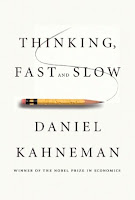The main premise of the book is that the human mind is divided into two parts, which Kahneman terms "System 1" and "System 2." System 1 is our gut instinct; it reacts without conscious thinking. System 2 is the slow and deliberate process that we bring in to solve difficult issues. Through the framing of the human brain in this manner, Kahneman exposes many of the fallacies that we are prone to.
There's tons of great tidbits to be gleaned from the book, so I'll just list a few I most enjoyed:
- Humans are highly susceptible to priming. Just seeing an image of money (e.g. dollar bills on a computer screen saver) can make us more selfish.
- We're prone to answering the easier question. Most people know that interviews aren't good at judging people's capability for a job. Part of that reason is because interviewers subconsciously answer the easier question: not "Is she good for the job?" but "Do I like her?"
- If we're asked to make a list of benefits (e.g. reasons why you should buy the car you like), we become less confident in the decision. Fluency (the ease at which we bring up answers) affects our feelings--it eventually becomes hard to think of many reasons, so we assume the decision is a poor one.
- Success = skill and luck. Because of this, if you do really well or really poorly on something, you are almost certain to do worse or better respectively the next time--you'll "regress to the mean."
- Most people suffer from hindsight bias. Once we change our mind, it's hard to recount our former beliefs; we feel we "always" felt that way.
- Formulas are usually more accurate than humans in prediction, even of complex things like a person's appropriateness for a job.
Overall the book is informative and engaging, with lots of "thought problems" to immerse the reader in the theories and plenty of illustrative studies. However, I do have a few criticisms. First, though Kahneman is obviously very intelligent and accomplished, he can, at times, come off as rather full of himself, particularly when he extols the virtue of one of his theories. Additionally, while the first three-quarters of the book were fascinating, I found the fourth section, "Choices," incredibly dull. This is a bit ironic since much of that section is on economics (his Nobel winning area). Nonetheless, the detailed economic theories were complicated and difficult to understand, and the unending gambling scenarios were tiresome. This part of the book felt much more like a textbook than the rest, and I had a hard time convincing myself to finish it.
Initially I started Thinking, Fast and Slow as an audiobook, but it's absolutely unsuited for that format. Much of the book requires stopping to think about problems before continuing or looking at graphs and illustrations, which is difficult to do with an audio book. I missed too much and quickly switched to the paper copy.
For those who also find illuminations of the working of the human mind endlessly entertaining (and, even, somewhat scary), I'd definitely recommend the book (though don't feel bad if you want to skip the last section).

I have made tons of notes while reading this book. It starts off a little slowly and it takes some time getting used to - beware, it's not a light book; each page is thought-provoking. The author is a fine educator and one can see it in the quality of his thought-process. There is wit and there is loads to think about while reading, and as this book describes, when the mind thinks, one tends to slow down :)
ReplyDelete